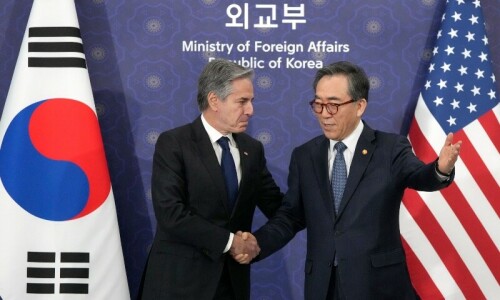ISLAMABAD: Pakistan Tehreek-i-Insaf (PTI) chief Imran Khan has approached the Supreme Court with a request to become party to a pending case seeking directions for making swift arrangements to grant overseas Pakistanis the right to vote before the upcoming general elections.
The Supreme Court is already seized with petitions moved by a group of citizens — on behalf of Solicitor Mohammad Dawood Ghazanvi, Farhat Javed and others — stating that denying overseas Pakistanis the right to participate in the democratic process would constitute a refusal by the government to carry out its constitutional obligations.
The petition highlighted that Pakistani expatriates consider the country their homeland and contribute nearly $18 billion in remittances to the national economy every year.
The case came up for hearing last week before a three-judge Supreme Court bench, headed by Chief Justice Mian Saqib Nisar, but the court decided to take up the matter again after stakeholders, including the Election Commission of Pakistan (ECP), came up with concrete proposals in this regard.
Imran Khan, Dr Arif Alvi, Sardar Azhar Tariq and others have now moved a fresh application before the Supreme Court, asking for the implementation of its own 2014 judgement in the Chaudhry Nasir Iqbal case, where the ECP was directed to make all possible efforts to ensure that expatriates could participate in the general elections and exercise the fundamental rights conferred by Article 17(2) of the Constitution.
Moved jointly by senior counsel Anwar Mansoor Khan and Chaudhry Faisal Hussain, the application asks the apex court to declare that overseas Pakistanis are also citizens of Pakistan and, as such, could exercise their right of franchise no matter where they live.
The application highlighted that the judgement in the Chaudhry Nasir Iqbal case was in line with Mr Khan’s earlier contentions, who had pointed out that under Article 189 of the Constitution any directions passed by the apex court was binding on all courts of Pakistan, as well as executive and judicial authorities, including the ECP.
The petition argued that the ECP could also exercise its powers “in anticipation of an ill that might have the effect of rendering the election unfair”, adding that it was legally empowered under Article 218(3) to exercise its powers pre-emptively to avoid a violation of these standards.
They contended that there was no legal bar keeping the commission from implementing the earlier judgement of the apex court, but regretted that the ECP failed to comply with the apex court’s judgement.
Mr Khan’s party enjoys a great deal of support among expatriate Pakistanis and has a strong support base in countries such as the UK and US, and his move is ostensibly aimed at expanding his own party’s voter base before the 2018 polls.
Published in Dawn, January 14th, 2018









































Dear visitor, the comments section is undergoing an overhaul and will return soon.